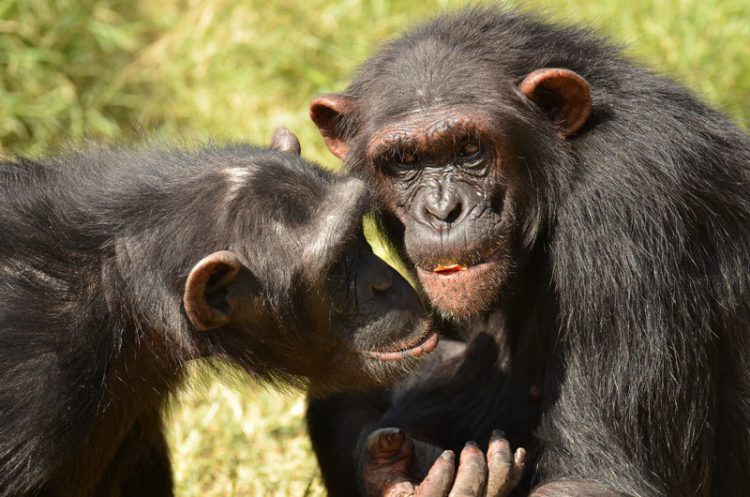Chimp friendships are based on trust

Chimpanzee friendships are also based on trust. © E. Herrmann
It almost goes without saying that trust is a defining element of genuine human friendship. Now, researchers of the Max Planck Institute for Evolutionary Anthropology in Leipzig, Germany, suggest that the same holds true among chimpanzee pals.
Their findings suggest that friendship based on trust has evolved much earlier than previously thought and is not unique to humans.
“Humans largely trust only their friends with crucial resources or important secrets,” said Jan Engelmann of the Max Planck Institute for Evolutionary Anthropology. “In our study, we investigated whether chimpanzees show a comparable pattern and extend trust selectively toward those individuals they are closely bonded with. Our findings suggest that they do indeed, and thus that current characteristics of human friendships have a long evolutionary history and extend to primate social bonds.”
Earlier studies had shown that chimpanzees have relationships that look something like friendships. For instance, they will extend favors preferentially toward selected individuals. The question was: are those interactions based on trust?
To find out, Engelmann and Esther Herrmann observed the interactions of fifteen chimpanzees living at Sweetwaters Chimpanzee Sanctuary in Kenya over a five-month period. Based on friendly interactions among chimp pairs, including grooming and eating together, the researchers identified each chimpanzee’s closest “friend” and a “non-friend.”
The researchers then asked the chimps to play a modified version of what is known as the human trust game, both with their friend and with their non-friend. In the game, chimps had a choice between pulling a “no-trust rope” and a “trust rope.”
When the no-trust rope was pulled, the first chimp got immediate access to a food he or she did not like especially well. When the trust rope was pulled instead, the other chimp got immediate access to a much more tempting food item and the option to send a treat back to the first chimp (or not).
In other words, the trust rope offered the potential for a win-win, but only if chimp one trusted chimp two enough to send something back. Each chimp played the game twelve times with his or her friend and another twelve times with his or her non-friend.
The results of those experimental interactions between the chimps showed much greater trust between friends than non-friends. As the researchers explain it, “chimpanzees were significantly more likely to voluntarily place resources at the disposal of a partner, and thus to choose a risky but potentially high-payoff option, when they interacted with a friend as compared to a non-friend.”
The findings suggest that human friendship is not so unique. “Human friendships do not represent an anomaly in the animal kingdom,” Engelmann said. “Other animals, such as chimpanzees, form close and long-term emotional bonds with select individuals. These animal friendships show important parallels with close relationships in humans. One shared characteristic is the tendency to selectively trust friends in costly situations.”
Engelmann and Herrmann say they would like to further investigate the similarities that exist between close relationships in humans and chimpanzees, including whether chimps are more likely to offer help to their friends.
Contact
Dr. Jan Engelmann
Max Planck Institute for Evolutionary Anthropology, Leipzig
Phone: +49 341 3550-427
Email: jan_engelmann@eva.mpg.de
Sandra Jacob
Press and Public Relations
Max Planck Institute for Evolutionary Anthropology, Leipzig
Phone: +49 341 3550-122
Fax: +49 341 3550-119
Email: info@eva.mpg.de
Original publication
Jan Maxim Engelmann und Esther Herrmann
Chimpanzees Trust Their Friends
Current Biology, 14 January 2016, (DOI: http://dx.doi.org/10.1016/j.cub.2015.11.037)
Media Contact
All latest news from the category: Life Sciences and Chemistry
Articles and reports from the Life Sciences and chemistry area deal with applied and basic research into modern biology, chemistry and human medicine.
Valuable information can be found on a range of life sciences fields including bacteriology, biochemistry, bionics, bioinformatics, biophysics, biotechnology, genetics, geobotany, human biology, marine biology, microbiology, molecular biology, cellular biology, zoology, bioinorganic chemistry, microchemistry and environmental chemistry.
Newest articles

Silicon Carbide Innovation Alliance to drive industrial-scale semiconductor work
Known for its ability to withstand extreme environments and high voltages, silicon carbide (SiC) is a semiconducting material made up of silicon and carbon atoms arranged into crystals that is…

New SPECT/CT technique shows impressive biomarker identification
…offers increased access for prostate cancer patients. A novel SPECT/CT acquisition method can accurately detect radiopharmaceutical biodistribution in a convenient manner for prostate cancer patients, opening the door for more…

How 3D printers can give robots a soft touch
Soft skin coverings and touch sensors have emerged as a promising feature for robots that are both safer and more intuitive for human interaction, but they are expensive and difficult…





















